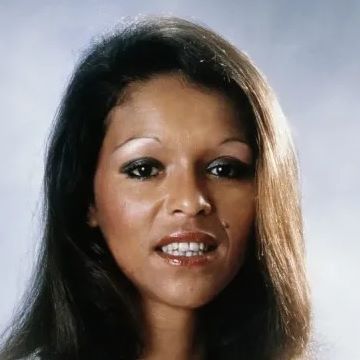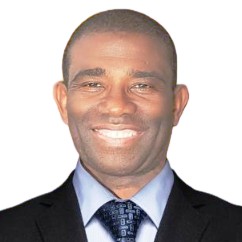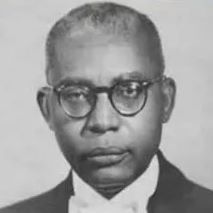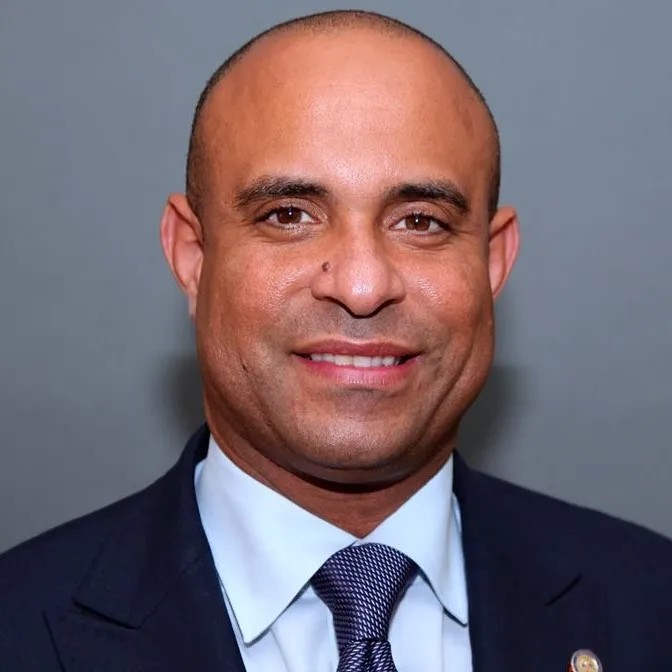Michel Martelly
| Michel Martelly | |
|---|---|
 |
|
| 41st President of Haiti | |
|
In office 14 May 2011 – 7 February 2016 |
|
| Prime Minister |
Jean-Max Bellerive Garry Conille Laurent Lamothe Florence Duperval Guillaume(Acting) Evans Paul |
| Preceded by | René Préval |
| Succeeded by | Jocelerme Privert (Provisional) |
| Personal details | |
| Born |
12 February 1961 Port-au-Prince, Haiti |
| Political party | Haitian Tèt Kale Party |
| Spouse(s) | Sophia Saint-Rémy (m. 1987)[1] |
| Children |
Olivier Sandro Yani Malaika |
| Religion | Roman Catholicism |
| Website | Official website |
Michel Joseph Martelly (French pronunciation: ?[mi??l ??z?f ma?teli]; born 12 February 1961[3]) was the President of Haiti from May 2011 until February 2016. Born in Port-au-Prince, Haiti, Martelly is one of Haiti's best-known musicians for over a decade, going by the stage name Sweet Micky. For business and musical reasons, Martelly has moved a number of times between the United States and Haiti. When travelling to the United States, Martelly mostly stays in Florida.
As a singer and keyboardist, "Sweet Micky" is known for his Kompa music, a style of Haitian dance music sung predominantly in the Haitian Creole language, but he blended this with other styles. Martelly popularized a "new generation" of compas with smaller bands relying on synthesizers and electronic instruments. From 1989 to 2008, Martelly recorded over a dozen studio albums and a number of live CDs. As a musician and club owner in Haiti in the late 1980s and early 1990s, Martelly became associated with the neo-Duvalierist Haitian military and police, including figures such as police chief Michel François, and he agreed with the 1991 Haitian coup d'état against Jean-Bertrand Aristide. In 1995, after Aristide had been restored to office, Martelly's name appeared on a hit list of coup supporters, and he stayed away from Haiti for almost a year. During this time, he released a song, "Prezidan" (on the album Pa Manyen), "an exuberant ditty that called for a president who played compas".[4] However, he did not run for political office until 2010, when he became a candidate for President of Haiti.
Martelly won the Haitian general election, 2010–2011 for his party Repons Peyizan (Farmers' Response Party), after a run-off against candidate Mirlande Manigat. Martelly had come in third in the first round of the election, until the Organization of American States forced Jude Célestin to withdraw due to alleged fraud. Martelly assumed his position of the President of Haiti on 14 May 2011. His election campaign included a promise to reinstate the nation's military, which had been abolished in the 1990s by Aristide.
Early life[edit]
Martelly was born in Port-au-Prince, the son of Gerard Martelly, a Shell Oil executive.[3][5] On his mother's side, his grandfather Auguste de Pradine was a troubadour[6] who wrote comic protest songs against the 1915-34 United States occupation of Haiti.[4] After graduating from high school at the Institution of Saint Louis de Gonzague, Martelly enlisted in the Haitian Military Academy, but (according to Martelly) was expelled after impregnating the god-daughter of a general.[3]In 1984, he moved to the United States, and worked in construction and briefly attended a community college in Miami.[3]In 1986, after one semester, he returned to Haiti just as Jean-Claude Duvalier, then president-for-life, was heading into exile. In 1987, Martelly returned to Miami with his then-girlfriend, Sophia Saint-Rémy,[4] whom he later married in a small ceremony in Miami, Florida.[citation needed] They returned to Haiti in 1988.[4]
Upon his return to Haiti, Martelly had his first breakthrough in the music industry when he began playing keyboard as a fill-in musician in local venues in Pétion-Ville and Kenscoff, upscale suburbs of Port-au-Prince.[4][7] Martelly "sang playful, romantic numbers over a slow méringue beat called compas, the only music allowed under the Duvaliers."[3] After the 1991 Haitian coup d'état saw the expulsion of Jean-Bertrand Aristide, "Martelly opened a Pétion-Ville club called the Garage, where he entertained many of the coup's main architects, including the much-feared chief of national police, Michel François, later convicted in absentia for massacring Aristide supporters."[3]
Music[edit]
Martelly has been heralded as a pioneer of a unique genre of compas, a style of Haitian dance music sung predominantly in the Haitian Creole language. Originally, compas, was the creation of Nemours Jean-Baptiste. Martelly, a keyboardist and the self-proclaimed "President of Compas," popularized a nouvelle génération, or "new generation" style, of smaller bands with few members that relied predominantly on synthesizers and electronic instruments to reproduce a fuller sound. Martelly's live performances and recordings are sometimes laced with physical humor and humorous sociopolitical commentaries and satires. Although he is the most recognized musician and public personality in Haiti, Martelly's performance style has sometimes ignited controversy throughout Haitian communities.
Recording career[edit]
By 1988, Martelly's musical talent, stage craft, and his pattering style of compas had gained tremendous popularity at El Rancho Hotel and Casino and The Florville, another local venues. That year, he recorded his first single, "Ou La La", which became an instant hit, followed by "Konpas 'Foret des Pins'" in 1989, also from his debut album Ou La La. During the period of about 1988-2008 Martelly, using his stage name Sweet Micky, recorded fourteen studio albums and a number of live CDs. His music features slow méringue, compas, troubadour, carnival méringue, rabòday, etc.
In 1997, Martelly's crossover appeal to other musical genres was evident when hip hop star, Wyclef Jean of The Fugees featured him on the title track for Jean's solo effort Wyclef Jean Presents The Carnival featuring the Refugee Allstars. As Jean proclaims on 'The Carnival,' "Surprise - it's Sweet Micky, y'all!" Also in 1997, Martelly released an album containing one of his most celebrated hits, Pa Manyen ("Don't Touch"). The song is an adaptation of "Angola", composed by the renowned artist/composer/record producer Ramiro Mendes (of the Mendes Brothers), first recorded by Cesária Évora, the legendary Cape Verdean singer. Pa Manyen went on to be featured in various compilation albums, including the popular Putumayo Presents: French Caribbean in 2003. The song was also covered by Venezuelan singer, Soledad Bravo as "Canta, Canta Corazon" and by Jose Luiz Cortes of Cuba. See also the Mendes Brothers' original version of the song, performed by Ramiro Mendes included in the group's 1997 album—Para Angola Com Um Xi Coracao. Martelly is also notorious for his cursing on stage, cross-dressing as well as using homophobic slurs. His celebrity status as a popular compas musician would become a major factor in his popularity as a politician.[8]
Political career[edit]
In 1992, Martelly played for free at a protest against the arrival of a UN representative charged with negotiating the return of Jean-Bertrand Aristide after the 1991 Haitian coup d'état.[3] Martelly later explained "I did not want Aristide back... You want me to be a de facto [supporter of the coup]. I'm a de facto. It's my right. It's my country. I can fight for whatever I believe in."[3] After Jean-Bertrand Aristide had been restored to office, some former military officers, paramilitaries and secret police associated with the old regime were assassinated. In February 1995, a "hit list" of such individuals was circulated, and included Martelly's name. After an individual on the list was murdered, Martelly's wife warned him not to come back from his tour, and it was almost a year before he returned to Haiti.[4] During this time he released a song, Prezidan, "an exuberant ditty that called for a president who played compas".[4] At the 1996 Carnival, to which Manno Charlemagne, the mayor of Port-au-Prince, invited him, Martelly dressed in a pink wig and bra.[4] As Martelly explained, it was intended in part as a political statement:
In 1997, Martelly participated in "Knowledge is Power", an HIV educational music video with a message about preventing the spread of HIV. His humanitarian work as the president of the Fondation Rose et Blanc, created by his wife Sophia and himself, to help the poor and disenfranchised of the country, was the basis for his choice as the Good Will Haitian Ambassador for the Protection of the Environment by the Haitian Government.
In 2004, following the 2004 Haitian coup d'état against Aristide, Gérard Latortue, a friend of Martelly's, became Prime Minister.[3] At this time, Martelly was living in Florida but in 2007, he moved back to Haiti. In the process, when the mortgage/financial sector crashed, he defaulted on more than $1m in loans, losing 3 properties to foreclosure.[3]
In 2010, he ran for President of Haiti in the general elections. He benefited from his celebrity status as a musician, and held musical rallies called koudjay (musical political endorsement rallies), drawing crowds and media attention.[8] He challenged the results as to whether he placed second, making the runoff, or third. On 3 February 2011, it was announced that he would participate in a run-off election scheduled for 20 March 2011.[9] On 4 April 2011, a senior official announced that Martelly had won the presidential run-off election against candidate Mirlande Manigat with more than 60% of the vote.[10]
Presidency[edit]
Martelly was sworn in as President on 14 May 2011, marking the first time in Haitian history that an incumbent president peacefully transferred power to a member of the opposition. The following day, the incumbent Prime Minister, Jean-Max Bellerive, resigned to allow Martelly to choose his own Prime Minister.[11] Martelly was quick to pledge reforms for the post-earthquake reconstruction process.[12]
In August 2011, Martelly announced a plan to reinstate the nation's military. This plan was met with controversy as many human rights activists were concerned about bringing back a military which had been responsible for many atrocities in the past.[13]
In September 2011, Martelly formed an advisory board that included business executives, bankers, and politicians such as former President of the United States Bill Clinton, that he hopes will improve business and economy in Haiti.[14]
In February 2012, Martelly's Prime Minister, Garry Conille, resigned, having been in office five months. He was replaced in May by Laurent Lamothe, the Foreign Minister.
In March – April 2012, Martelly was accused of corruption, with allegations that during and after the 2010 election, he had accepted $2.6 million in bribes to ensure that a Dominican Republic construction company would continue to receive contracts under his Presidency. Martelly denied the allegations.[15] Companies owned or controlled by Félix Bautista had received no-bid contracts worth $200 million, awarded by former Prime Minister Jean-Max Bellerive.[16] In November 2013, anti-government protests were held in the country over the high cost of living and corruption.[17]
Mid-term Senate elections had been originally due in May 2012, while the municipal poll is three years behind schedule. They were postponed again on 26 October 2014—the day they were due to be held—because of an ongoing stalemate between the government and a group of opposition senators over an electoral law. The Haitian government faced months of protests over the delayed elections. Prime Minister Laurent Lamothe resigned on 14 December and was replaced by Evans Paul. But street protests have continued, with renewed calls for the president's resignation.
On 13 January 2015 the parliament was dissolved after its term expired. On 17 January 2015 thousands of protesters in the capital demanded the president's resignation. Police used tear gas and water cannon to disperse the crowd. Martelly urged protesters to keep order and said he had reached a deal with the opposition to form a consensus government within the next 48 hours.[18] New election dates were announced in March 2015, both for parliament and for president. Martelly is ineligible to run again as Haiti's constitution does not allow for consecutive terms.[19]
On 9 August 2015 the first election Haiti had under President Michel Martelly took place. The citizens voted in the first round to fill two-thirds of the 30-member Senate and the entire 119-member Chamber of Deputies. In Port-au-Prince groups of young men ripped up paper ballots as heavily armed police shot into the air to re-establish order. Rocks were thrown in response before authorities closed the polling station. Local media reported the closure of numerous polling places in other parts of the country and scattered arrests of people accused of voting more than once. 54 polling stations, roughly 5 percent of the total, were closed amid violence and other disruptions. The first round of Haiti's presidential election is set for 25 October 2015.[20]
Presidential elections were held in Haiti on 25 October 2015, alongside local elections and the second round of the legislative elections.[21] The runoff of this election will be held on December 27, 2015.[22] According to preliminary results posted by the Provisional Electoral Council, Jovenel Moïse obtained 32.81% of the preferences, and Jude Célestin won 25.27%.[23]
After the preliminary results were published on 25 October 2015, Jude Célestin said he did not recognize them. His criticism was joined by five other presidential candidates. They issued a joint statement denouncing the results as “anti-democratic” and called for the people’s vote to be respected. Martelly had openly declared his support for Moïse.[24] The supporters of Célestin protested in the streets, together with the supporters of Jean-Charles Moïse’s Platfom Pitit Desalin and supporters of former President Jean-Bertrand Aristide’s Fanmi Lavalas party the presidential candidate of which, Maryse Narcisse, finished fourth behind Jean-Charles Moïse and also denounced the results during a news conference. The protesters threw rocks and burned tires. The police responded with tear gas and made some arrests. The police also stopped and searched the vehicle of a former top government prosecutor, Claudy Gassant, who is a supporter of Moïse.[25]
Martelly resigned the presidency on February 10, 2016, leaving Haiti without a president for a week. On February 17, 2016, he was succeeded by Jocelerme Privert who serves as interim president.[26][27] Amid allegations of fraud in the 2015 elections, Privert created a month-long verification commission to restore legitimacy to the electoral process. In May 2016, the commission audited ~13,000 ballots and determined that the elections had been dishonest and recommended a complete redo of the election.[28][29]
In 2015, Pras of the Fugees completed a documentary entitled Sweet Micky For President, chronicling the rise of Martelly through his election to fight corruption as President of Haiti. The film had its World premiere at the 2015 Slamdance Film Festival.[30]
Personal life and later music career[edit]
Martelly currently lives in Haiti, but held several homes in Palm Beach, Florida. He lives with his wife and former manager, Sophia Saint–Rémy, and their four children, Olivier, Sandro, Yani, and Malaika.[31] In 2006, Martelly announced his unofficial retirement from recording and performing, but two years later announced a return to music with a new single, Magouyè, and the video/short film, "Bandi Legal yo ki rive". He is a cousin of Port-au-Prince hotel manager and musician Richard Morse.[32]
In April 2012, Martelly was flown to the United States for treatment of what was later diagnosed as a pulmonary embolism.[2] It was attributed to the immobilisation of his arm necessitated by recent shoulder surgery.[33]
| Address | |
| Phone | ,, |
| Fax |










































